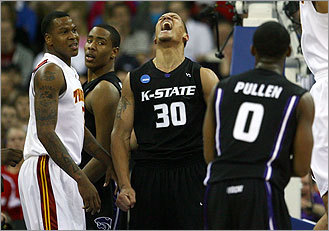As journalism students deal with the anxiety of entering a field that is in the process of transforming, there are some signs of hope.
Despite facing interesting issues as the world becomes more Web-oriented and millions more would-be journalists log on, there are success stories of innovative journalists finding their way in Web journalism. Mac Slocum is one of them.
“I think there is a lot of fear-mongering in journalism,” said Slocum, 33, who has built a steady career in Web journalism. “I’ve been around a while and I recognize the pros and cons of the industry, but I believe in it. The role of journalists is important and always will be.”
After getting his bachelor's and master’s degrees in Journalism from Richmond University and Emerson College, respectively, Slocum worked as an editor and producer, mostly online, for publications in the Boston area. In addition to teaching Web journalism at Emerson, Slocum owns the Fodder Network, a collection of blogs, and runs a few independent Web sites.
“He is an incredibly innovative online entrepreneur,” said Ned Brown, a former student of Slocum’s, who also recently got his master’s in journalism from Emerson. “He seems to be a journalist first, who picked up online skills to go with that. He’s a pioneer of true online journalism.”
As Slocum can attest, the Web is becoming a large part of the everyday media. As the journalism industry tries to find the appropriate balance between print and new media, it’s important for all journalists to get acclimated with the Web.
“Journalism is trying to find the ideal way to tell stories online and transition from creating print stories that go straight to the Web to designing for the Web,” said Brown, whose
work as a multimedia Web producer can be found on BU Today’s Web site. “In the next few years stories will be produced for Web, not for print, so the order will reverse.”
Slocum’s main site is
The Independent Publisher, which he started as his master’s project at Emerson. The purpose of the site was for Slocum to share his knowledge in Web publishing with anyone who was interested.
“The target audience is anyone who is interested in Web journalism, Web business and Web technology,” said Slocum. “I originally developed it as an online textbook geared toward a creative person interested in starting their own site. It was basically steps to get them on their feet.”

Two years ago, Slocum revitalized the site and added to it a blog, which he uses to get helpful information to his readers and report on Web-related news. Apart from the original site, which is full of resources and advice to start your own site, the blog now also offers original
video tutorials that he creates and posts to help users perform specific tasks for their own pages.
“I try to post stuff that is applicable to students looking to get into the Web journalism world,” said Slocum. “I try to provide things that benefit you if you go the independent route.”

Blogs have become a new aspect of journalism that allows news to be reported and updated more quickly than print outlets could ever match. This advantage is what causes some to speculate that newspapers and journalists could soon be replaced by Web sites, blogs and bloggers, but those in the industry aren’t so sure.
“I’d say blogs are great for getting ideas out, but I don’t believe in blogs as official news sources,” said Brown. “If I had one Web source for news, it wouldn’t be a blog.”
This 2006
graph produced by Technorati lists the top 50 blogs and mainstream media sites by how much they were being linked to other sites. At the end of 2006, not much more than a year ago, mainstream media were still in control, but blogs were having an impact.

Although there are blogs out there produced by professional journalists and serious bloggers, Slocum believes the role of the journalist is something that will simply adapt to the Web, not be replaced by it.
“If you take a careful look at the way content is developed, journalists are as important as ever,” said Slocum. “The ability to find and nurture information to create original material provides the primary information that is the jumping off point for bloggers.”
He contends that, like any news source, it’s what blogs produce and how they reach and affect their readers that will determine their reliability.
“I think blogs, just like many news sources, have to forge a relationship with readers, built on trust,” said Slocum. “A blog is just a thing, but it’s what you do with it that matters. There are plenty dedicated to building that trust just like print has to.”
“There’s a difference between regular blogs and repectable blogs and it’s up to the people reading them to decide,” said Mark McLaughlin, a junior Journalism major at Northeastern University.
Some think the idea of journalism will prevail in creating reliable news on the Web and that blogs in fact help journalists.
“If they’re enough into real journalism, they’ll write respectable blogs,” said McLaughlin.
“They’re a great source for reporters, who can learn things they didn’t know from blogs,” said Steve Outing, who wrote an article called “
The Blog-Only News Diet” for Poynter Online, which follows an experiment in how much one can learn about current events relying solely on blogs.
“Blogs are a great research tool, but are another source to corroborate because any idiot with a library card can put something on the Web,” said Stephen McCaskill, who writes the
Crime Scene Blog, which covers national crime stories. “Some are reliable and some are full of innuendo and there aren’t sources you can follow up with.”
The trend even works in reverse, as trained journalists, like Slocum, now have the chance to use their skills in writing their own blogs, {no comma} on topics they may not have the chance to cover in their journalism careers.
"I have an advice Web site for news publishers called
Growing Your News Web Site,” said Outing, who also blogs on
SteveOuting.com and has had a successful career in print and online. “I’ve been doing all sorts of writing, researching, consulting and entrepreneurial things involving the intersection of the internet and mixed media for a long time.”
An entrepreneur himself, Slocum also started
Filmfodder and
TV Fodder, as creative outlets that serve more as entertainment journalism blogs for those who want to stay current on TV and movies.
“It’s a place fans of pop culture can converse on what they’re really interested in and love,” said Slocum. “It’s been the most gratifying. It’s not lucrative, but it pays for itself.”
Those bloggers who aren’t trained journalists, but get online to report news on whatever they see fit, practice citizen journalism.
“I tend to be critical of citizen journalism in its native state because it hasn’t been conceptualized how to integrate it into the industry,” said Slocum.
Slocum has blogged on the subject of
citizen journalism, which seems most prevalent during breaking news where the public wants as much information as possible.
“I felt that after the Virginia Tech shooting, attention was paid to citizen journalism as a buzz word, but there was little analysis,” said Slocum.
Outing sees citizen journalism as more helpful than threatening.
“A classic example was the London subway bombing where the eyewitnesses posted photos taken with their phones, so citizen journalism was in the mix with the professional coverage,” said Outing. “It allows for deeper coverage than professional journalists in the old days could produce. I’ve always viewed it as complementary."
With the industry in transition, young journalists are left questioning what skills they need to develop to adapt to the world of Web journalism.
As citizen journalism continues to impact the industry, professional journalists sees interaction as an important skill for young journalists.
“You need core journalism skills the same as always,” said Outing, “but today you need to learn to interact with your community much more because the audience has a voice.”
Young journalists themselves see a new environment to adapt to, but with an understanding that the old rules still apply.
“I think a big thing is that journalism is around the clock now because you always have to be ready to publish right away, rather than wait for a deadline,” said McLaughlin. “It’s face-paced, but young journalists have to realize that standards and ethics still apply despite the quick schedule.”
As someone who has adapted very well, Slocum believes it is understanding the Web for what it is that is most important.
“Young journalists have to understand the Web as a distinct medium, and its strengths and limitations,” said Slocum. “They need to understand the technology used to create Web stories and be able to collaborate with people to make them.”
 The latest controversy to come out of the White House has nothing to do with the war in Iraq, the economy or even George Bush.
The latest controversy to come out of the White House has nothing to do with the war in Iraq, the economy or even George Bush.



























